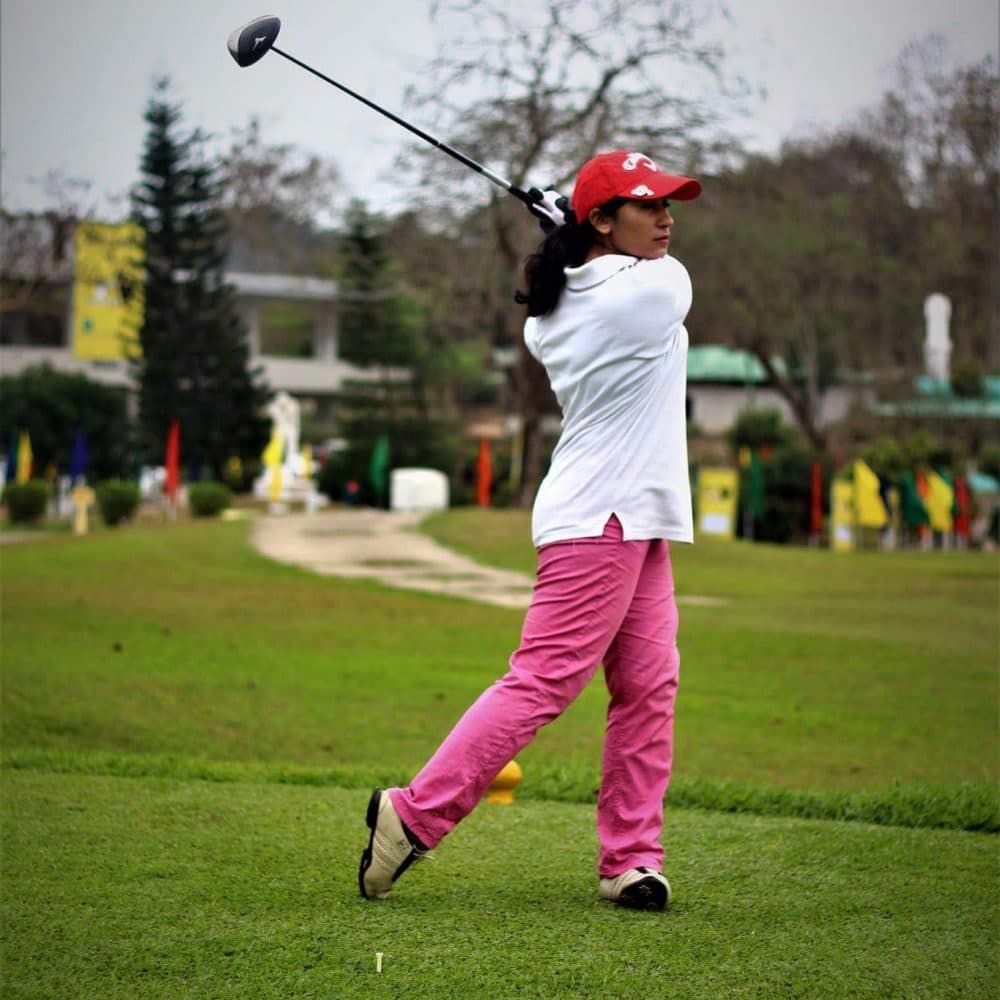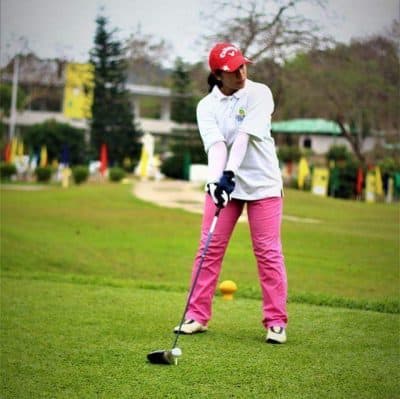Advertisement
Golf In Afghanistan: Shagufa Habibi Drives For A Better Life
Resume
Before it was her turn to take the shot that could change her life, Shagufa Habibi remembers being uncomfortably warm.
Shagufa and 11 of her teammates were standing on a soccer pitch in Herat, Afghanistan. Herat doesn't have a golf course, so this soccer pitch was the best her team could do. It was a summer afternoon — the hottest part of the day in a city where temperatures can exceed 100 degrees. It was the only time locals would let the women have the field.
Shagufa wore a long black dress and a head scarf. She carried a wooden club.
Each of the women had one chance to hit a ball at a target at the other end of the field. Whoever got closest would get to attend a golf tournament in Bangladesh.
Shagufa was one of the newest players on the team, and — besides crossing over into nearby Iran — she’d never left Afghanistan. As she waited her turn, she doubted that would change.
But she hoped it would.
'A Conservative Family In A Conservative Society'
Shagufa Habibi was born in 1995, the youngest child in a large family. Her parents are illiterate. Her dad made his living selling dried fruit — until his hand was mangled in a terrorist attack at a local mosque.
"I can say that I was in a conservative family in a conservative society," Shagufa says.

When Shagufa was a young girl, the Taliban controlled Afghanistan. Girls couldn’t go to school, so Shagufa and her seven sisters stayed home. Shagufa was allowed outside just once a day, to help her mom buy food.
"We had this fear: If you go out, the Taliban will kidnap us or they will hit us or they will kill us," Shagufa says. "So we had this fear, almost all the days and nights, so we could not go out."
In 2001, the Taliban lost control of the government, and schools opened for girls. Shagufa's friends started attending. But Shagufa’s father wouldn’t have it – he believed women belonged at home.
So Shagufa and her sisters devised a plan. After their father left the house in the morning, they would sneak off to school.
Then at night, they'd take turns stealing away to a guest room to study by candlelight. When they finished, Shagufa and her sisters would stash their school books and notebooks in a closet.
"And we didn't have any bag – a school bag. We had a plastic one, like we were going shopping," Shagufa says. "So we just put our books and notebooks in that."
'You Are Going To School?'
That plan worked for about a year. Then one morning, Shagufa's father spotted her in her school uniform on her way to class – and confronted her.
"He just said, 'You are going to school?' And I didn't say anything," Shagufa remembers. "I came back home and I was just saying that, 'My father saw me!' Then, all my sisters, they afraid so much. At night, when he come, he say, 'How you dare to go to school without telling me? You know that it's a shame for me, for all my ancestors, that you are going?'"
Later that evening, Shagufa approached her father, after he had calmed down. She explained that she and her sisters had been attending school for an entire year — and that they were willing to continue paying for their own school supplies and uniforms.
Her father thought it over for a couple days. Finally, he agreed to let his daughters go back to school. And Shagufa excelled. As she got older, she even tutored other students in math and chemistry.
But then in 2011, when Shagufa was still in high school, she became engaged to a man nearly twice her age. Her father made the decision.
"He say that, 'We don't have enough money – we have economic problem. This man is, like — he's rich. And he will help you for your university, this and that. And you should accept it. If you do not, I'm your father,'" Shagufa recalls. "So, somehow I accepted. They made me to accept that."
Finding Golf
After she was married, Shagufa kept going to school. But the more time she spent with her new husband, the more she says she realized he didn't want her in school. He wanted her home.
So after one year of marriage, Shagufa left her husband. She went back to her parents' home in Herat. Shagufa says she was depressed, without hope.
And this is when sports entered Shagufa's life. Her high school had a girl's basketball team. She decided to check out a practice — and it was fun.
"I was forgetting everything," Shagufa says. "I'm just free. And this ball was giving me more motivation for my future to be so optimistic."
Practices were at 6:30 a.m., three days a week. Shagufa knew her father wouldn't approve of her playing sports, so she told him she was going to school early to meet with teachers.
Then Shagufa learned about another sport available to women in Herat: golf.
"If I say golf is the turning point of my life, I am not lying."
Shagufa Habibi
As I mentioned earlier, Herat doesn’t even have a golf course. But a coach and a group of women gathered in the dry, hilly land outside the city to practice driving. They used that soccer pitch to practice shorter shots. The coach even got permission from the soccer federation to make a hole for putting.
The entire team shared two sets of wooden clubs.
Shagufa fell in love with the sport – she loved walking on the open land and the focus needed to hit a good shot.
"When my shot my was straight and flying, it was everything for me," she says with a laugh.

Not long after she joined the team, Shagufa's coach received some news. The Bangladesh golf federation was hosting an international tournament. One female player from Herat was invited to attend.
That’s when Shagufa’s coach decided to hold that intrasquad competition on that hot summer day: closest to the target would go to Bangladesh.
When it was her turn, Shagufa stepped to the tee, took a breath and focused on the ball and the target.
She swung. Shagufa says her shot went high in the air and then came down near the target. She was the closest.
"For me, I could not believe that. I said, 'No, it's not possible!' I could not even believe that it's me," Shagufa says.
Hatching Another Plan
But there was still one familiar obstacle: Shagufa’s father. She was afraid he wouldn’t want her leaving the country, especially not for a sports competition.
So Shagufa, once again, hatched a plan.
"This was my plan: first, I tell to my mother that I'm going out — 'It's going to be just...only for 10 days. Please help me,'" Shagufa recalls. "Then I told to my sisters, 'If my father, somehow, he asks, 'Where is Shagufa?' tell him that I'm so depressed, I'm just going to my sister's house for some weeks, and then I will be back.' They supported me and told my father that I'm going for my sister's house."
"Were you nervous about this plan? About whether it would really work?" I ask.
"Yeah, I was. It's like when you are trying to hide something," Shagufa says. "I had this fear, that I'm now in the airport, if they ask me that 'Where is your father?' Or if my father somehow understands and then comes to the airport and stops me. And all the players, they will look at me — if my team manager understand that my father is strict, he would reject me. Yeah, I had this kind of fear."
It wasn't until the airplane took off to begin the 1,500 mile journey to Bangladesh that Shagufa felt safe.
"I was just looking down, so I was seeing that I'm so high. Then I said, 'If now my father can understand that I'm out of the country, he cannot do anything,'" Shagufa says.
Shagufa was amazed by what she saw in Bangladesh. Girls weren't wearing long dresses or scarves. She says women looked so free.
On the final day of the trip, the Afghan embassy hosted their players for a lunch. The conversation turned to education. Shagufa had a question – but she wasn’t sure she should speak up.
"'Should I ask them or not, should I ask them or not?'" Shagufa remembers thinking. "Then I said that, 'Would you tell me, please: how is the education in Bangladesh? And is it possible for me, somehow, I come and do my education?' And then they said, 'Sure. There is one university you can go for that, which is called AUW.'"
AUW – Asian University for Women. It opened in Chittagong in 2008 to educate underserved women from all over Asia. That next day, Shagufa flew home — and headed for an internet cafe.
"It was 8 a.m. that I reached to Afghanistan. I think it was 11 a.m. that I started to search about AUW. I even didn't wait — didn't wait one day," Shagufa says.
Shagufa applied — and was accepted.
'I Don't Know How This All Comes In Front Of Me'
The last step was convincing her father to let her go. Shagufa explained that she wouldn't have to pay. She had received a scholarship funded by the U.S. State Department.
Her father agreed.
Shagufa's now 22 years old, in her second year at AUW, studying economics. She still finds time to play golf and she’s hoping to start a club for other women at her university.
"If I say golf is the turning point of my life, I am not lying," she says.
Shagufa’s personal situation back home isn’t settled – she's not yet legally divorced – and she's not sure whether she'll end up living in Herat again.
But she dreams of someday returning to her home city to lead the golf team there. She hopes to show other Afghan women that a game can change their lives, too.
"I don't know how this all comes in front of me," Shagufa says. "All these opportunities. Everything, I think, set up, one after another one. I cannot even believe that."
After getting to know Shagufa Habibi a little bit, I can believe it.
This segment aired on July 1, 2017.
